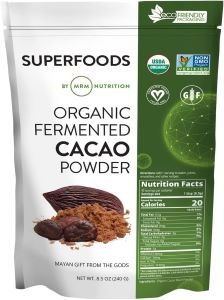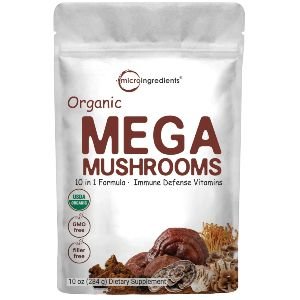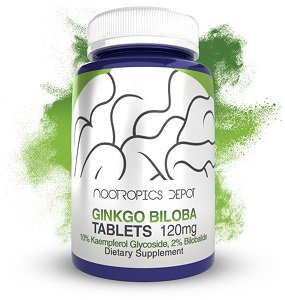33 Best Foods For Gut Health And Which Ones To Avoid
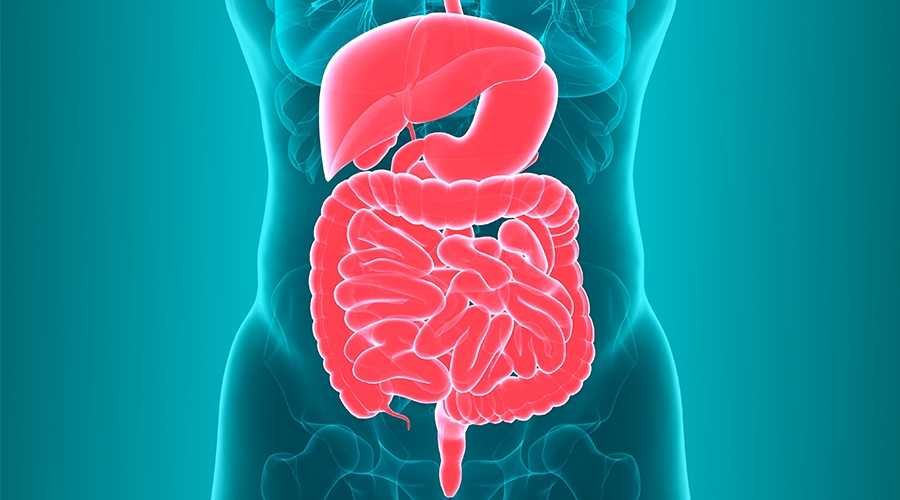
Looking to improve your gut health? Discover the best foods for gut health and learn which ones to avoid in this article.
You’ll explore a variety of gut-healthy foods that promote a thriving gut microbiome and support digestion. From probiotics like sauerkraut and kefir to prebiotics found in garlic and bananas, these foods are packed with beneficial bacteria and fibers that nourish your gut.
Plus, you’ll learn about the importance of fiber-rich foods and the role of polyphenols in promoting a healthy gut.
Take steps towards a healthier gut and a happier you.
How to improve your own microbiome?
To improve your own microbiome and promote a healthy gut, focus on incorporating gut-healthy foods like probiotics, prebiotics, fiber, and polyphenols into your diet.
- Probiotics are found in foods like sauerkraut, kimchi, kefir, kombucha, and yogurt. These foods contain beneficial bacteria that aid digestion and support a healthy gut.
- Prebiotics, such as garlic, onions, bananas, asparagus, and chicory root, provide the necessary fibers to feed the good bacteria in your gut.
- Fiber-rich foods like whole grains, legumes, fruits, and vegetables are also essential for a healthy gut.
- Lastly, polyphenols, found in berries, green tea, dark chocolate, red wine, and olive oil, have antioxidant and anti-inflammatory properties that support gut health.
By making simple changes to our diet we can have a healthy and balanced gut microbiome.
✅ Best foods for gut health
To improve gut health, incorporate the following foods into your diet:

1. Sauerkraut
Sauerkraut is a great option for improving your gut health, as it contains probiotics and provides 4 grams of fiber per cup. Probiotics are beneficial bacteria that help promote a healthy gut microbiome. These bacteria aid in digestion and support your immune system.
The fiber in sauerkraut helps regulate bowel movements and promotes a healthy digestive system. Incorporating sauerkraut into your diet can be as simple as adding it to salads, sandwiches, or even enjoying it as a side dish.
☝️ TIP: It’s important to choose unpasteurized sauerkraut, as the pasteurization process can kill the beneficial bacteria. Remember to start slow if you’re new to sauerkraut to allow your body to adjust to the increase in fiber and probiotics.
2. Sourdough
Incorporating sourdough into your diet can be a delicious way to support a healthy gut, as it contains beneficial bacteria and is easier to digest than traditional bread.
Sourdough is made through a fermentation process that involves wild yeast and lactic acid bacteria. This fermentation process helps break down the gluten and phytic acid, making sourdough easier on the digestive system.
Additionally, sourdough contains a higher amount of prebiotics compared to regular bread, which can promote the growth of beneficial bacteria in the gut.
☝️TIP: When choosing sourdough, opt for varieties made with whole grains for added fiber and nutrients. You can enjoy sourdough as toast, in sandwiches, or as a base for pizza or bruschetta to support a healthy gut.
3. Kimchi
If you’re looking to diversify your probiotic intake, kimchi is a flavorful option that contains beneficial bacteria and can support a healthy gut.
Kimchi is a traditional Korean dish made from fermented cabbage and other vegetables, such as radishes and carrots, seasoned with spices like chili powder, garlic, and ginger.
During the fermentation process, lactic acid bacteria, known as probiotics, are produced, which can help maintain a balanced gut microbiome.
Additionally, kimchi is rich in vitamins A and vitamin C, as well as antioxidants that can help reduce inflammation in the body.
Adding kimchi into your diet can be as simple as adding it to salads, rice bowls, or enjoying it as a side dish.
4. Kefir
You can enjoy kefir as a drinkable yogurt packed with probiotics, making it a versatile option for smoothies or as a milk substitute. Kefir contains beneficial bacteria that can support a healthy gut. These probiotics can help improve digestion and promote a balanced gut microbiome.
Kefir is also rich in nutrients like calcium, protein, and vitamins B12 and Vitamin K2. It’s a good source of antioxidants and may have immune-boosting properties. Incorporating kefir into your diet can be beneficial for those with lactose intolerance, as the live cultures in kefir help digest lactose.
5. Kombucha

Kombucha is a tart and fizzy tea made by fermenting green or black tea. The fermentation process creates beneficial bacteria that can help improve digestion and promote a balanced gut environment. These probiotics can support the growth of good bacteria in your gut, which is essential for optimal gut health.
Kombucha is also rich in antioxidants and polyphenols, which have been linked to various health benefits. These include reduced inflammation and improved immune function. It can be enjoyed on its own or used as a refreshing base for smoothies or mocktails.
However, it’s important to note that kombucha does contain a small amount of alcohol and can be high in sugar. Therefore, moderation is key when consuming it.
6. Ayran
Ayran, a traditional Middle Eastern beverage, is a refreshing yogurt-based drink that can provide probiotics and support a healthy gut. Made by combining yogurt, water, and sometimes salt, Ayran offers a tasty way to boost your gut health.
Probiotics found in Ayran help maintain a balanced gut microbiome, which is crucial for digestion and overall well-being. The live cultures present in yogurt contribute to these probiotic benefits.
Drinking Ayran regularly can help improve digestion, reduce inflammation, and enhance nutrient absorption.
Additionally, Ayran is a great source of calcium and protein. It can be enjoyed on its own or paired with meals to complement a healthy diet.
☝️ GOOD TO KNOW: Ayran and kefir are dairy-based drinks, but they differ significantly. Ayran is a Turkish yogurt-based drink mixed with water and a pinch of salt, known for its creamy and slightly salty taste. Kefir, on the other hand, is fermented milk, often tangy, thicker, and richer in probiotics due to diverse bacterial strains.
7. Miso and Natto
If you’re looking to add some variety to your probiotic intake, consider trying miso and natto, two fermented foods that offer unique flavors and potential health benefits.
Miso is a fermented paste made from soybeans, barley, or rice. It contains beneficial bacteria and is high in sodium.
Natto, on the other hand, is made from fermented soybeans and is rich in probiotics, protein, and various nutrients.
Miso and natto can both contribute to a healthy gut by promoting the growth of beneficial bacteria. They can also enhance the flavor of your dishes and add a savory element to your meals.
Miso can be used in soups, marinades, and dressings, while natto is often enjoyed as a topping for rice or in sushi rolls.
☝️ TIP: When incorporating miso and natto into your diet, it’s important to be mindful of portion sizes, especially if you’re watching your sodium intake. Start with small amounts and gradually increase as tolerated.
8. Tempeh
Now let’s talk about another gut-healthy food: tempeh. Tempeh is a fermented food made from soybeans and is packed with probiotics, which are beneficial bacteria that support a healthy gut. Not only is tempeh a great source of probiotics, but it’s also high in protein and various nutrients.
Tempeh is a versatile ingredient that can be used in a variety of dishes. You can marinate it, grill it, or crumble it to use as a meat substitute in recipes like stir-fries, salads, and sandwiches.
In addition to its gut-healthy benefits, tempeh is also a good source of calcium, iron, and fiber. It can help support digestion, promote satiety, and contribute to a balanced diet.
9. Sheep Yogurt
Sheep yogurt is a creamy and tangy probiotic food that provides numerous health benefits for your gut.
It’s made from the milk of sheep, which contains beneficial bacteria like Lactobacillus and Bifidobacterium. These live cultures help promote a healthy balance of bacteria in your digestive system, improving digestion and nutrient absorption.
Sheep yogurt is also a good option for those who are lactose intolerant, as the live cultures help break down lactose, making it easier to digest.
🤔 Why Sheep Yogurt Instead of Cow Yogurt?
According to a study published on PubMed, both fermented cow and sheep milk improved gut microbiota composition in male Sprague-Dawley rats. However, the study also showed that sheep yogurt had a greater effect on increasing the abundance of beneficial bacteria, such as Lactobacillus and Bifidobacterium, compared to cow yogurt.
Additionally, a video on YouTube by Dr. Gundry explains that sheep and goat yogurt are healthier alternatives to cow yogurt due to their unique properties, such as being easier to digest and containing higher amounts of beneficial fats and proteins. Therefore, sheep yogurt may be a better choice for gut health compared to cow yogurt.
10. Almonds
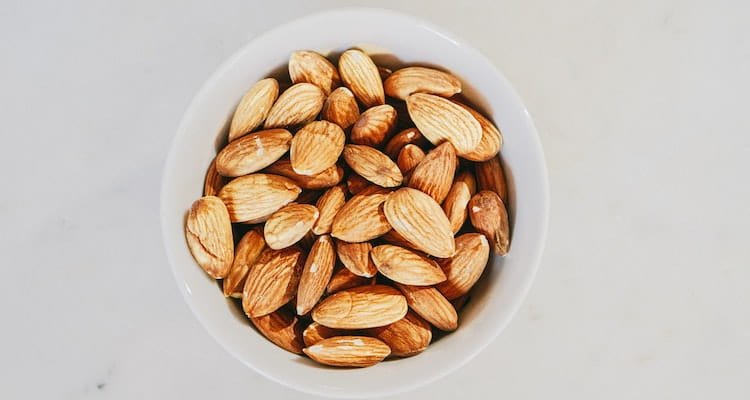
Almonds are a nutritious and gut-healthy snack that provides essential nutrients like fiber, protein, and antioxidants. They’re a great addition to your diet for maintaining a healthy gut.
Almonds are high in fiber, which promotes regular bowel movements and supports the growth of beneficial bacteria in the gut. They also contain protein, which is important for repairing and building tissues.
Additionally, almonds are rich in antioxidants, which help protect the gut from damage caused by free radicals.
11. Onions
Including onions in your diet can contribute to a healthy gut by providing prebiotic fibers that support the growth of beneficial bacteria.
Onions are a great source of inulin, fructans, and fructooligosaccharides, which act as fuel for the good bacteria in your gut. These prebiotic fibers help promote a diverse and balanced gut microbiome, which plays a crucial role in digestion and overall health.
Onions also offer various other health benefits, such as anti-inflammatory properties and potential heart health benefits. Incorporating onions into your meals is easy – you can add them to salads, stir-fries, soups, and many other dishes.
12. Beans and Legumes
When it comes to supporting a healthy gut, beans and legumes like chickpeas, lentils, and black beans are excellent choices that provide a good source of fiber and promote the growth of beneficial gut bacteria. These foods aren’t only delicious and versatile, but they also offer numerous health benefits.
The fiber found in beans and legumes helps to regulate bowel movements and prevent constipation. Additionally, the resistant starch in these foods acts as a prebiotic, feeding the beneficial bacteria in your gut and promoting a healthy gut microbiome.
Incorporating beans and legumes into your diet can help improve digestion, support weight management, and reduce the risk of chronic diseases such as heart disease and type 2 diabetes. So go ahead and enjoy a hearty bean chili or a delicious lentil soup to nourish your gut and boost your overall health.
13. Asparagus
Asparagus is a powerful prebiotic due to its fructans and antioxidants, helping to fight off free radicals and inflammation.
Including asparagus in your diet can support a healthy gut by promoting the growth of beneficial bacteria. The fructans found in asparagus act as fuel for these bacteria, allowing them to thrive and support your digestive system.
Additionally, the antioxidants in asparagus help combat oxidative stress and reduce inflammation in the gut. This can have a positive impact on overall gut health and may help prevent chronic diseases.
To incorporate asparagus into your diet, try grilling or roasting it as a side dish, adding it to salads, or including it in stir-fries. Remember to enjoy asparagus in moderation and alongside a balanced diet rich in other gut-healthy foods.
☝️ TIP: Wild harvested asparagus is a healthier and more sustainable option compared to cultivated asparagus. Wild asparagus is free from pesticides and herbicides, making it a safer choice for consumption. Additionally, wild asparagus is a natural source of nutrients, and its harvesting does not harm the environment. Therefore, choosing wild harvested asparagus over cultivated asparagus can benefit both your health and the planet.
14. Garlic
Garlic, with its inulin and fructooligosaccharides, supports heart health and has anti-inflammatory properties that contribute to a healthy gut. Including garlic in your diet can help promote a balanced gut microbiome and improve overall digestive health.
The inulin and fructooligosaccharides found in garlic act as prebiotics, which are fibers that feed beneficial probiotics in the gut. This helps to increase the growth of good bacteria and improve the diversity of the gut microbiota.
In addition, garlic’s anti-inflammatory properties can help reduce inflammation in the gut, which is important for maintaining a healthy digestive system.
15. Bananas

Including bananas in your diet can provide you with prebiotic fibers like inulin and fructooligosaccharides that support the growth of beneficial bacteria in your gut. These fibers act as food for the good bacteria in your digestive system, helping them thrive and maintain a healthy balance.
Bananas are also a great source of vitamins and minerals, including potassium, vitamin C, and vitamin B6, which are essential for overall health. They’re easily accessible, affordable, and versatile, making them a convenient choice for improving gut health.
Whether eaten on their own, added to smoothies, or used in baking, bananas can be a delicious and nutritious addition to your daily diet.
16. Pears
When it comes to supporting your gut health, pears are a fantastic choice due to their pectin content, which can help lower cholesterol and provide 5.5 grams of fiber per medium pear.
Pectin is a type of soluble fiber that acts as a prebiotic, feeding the beneficial bacteria in your gut. By promoting the growth of these good bacteria, pears can help improve digestion and support a healthy gut microbiome.
Additionally, the fiber in pears can help regulate bowel movements and prevent constipation. Pears are also a hydrating fruit, containing high water content that can aid in digestion.
17. Watermelon
Watermelon is a refreshing and hydrating fruit that can contribute to a healthy gut by providing natural fructans. Fructans are a type of prebiotic fiber that acts as food for the beneficial bacteria in your gut. These bacteria help maintain a balanced gut microbiome, which is essential for digestion and overall health.
In addition to being a good source of fructans, watermelon is also high in water content, which helps promote hydration. Staying hydrated is important for maintaining proper digestive function.
Watermelon is a versatile fruit that can be enjoyed on its own or used in various recipes, such as salads or refreshing beverages. Incorporating watermelon into your diet is a delicious way to support a healthy gut.
18. Chicory
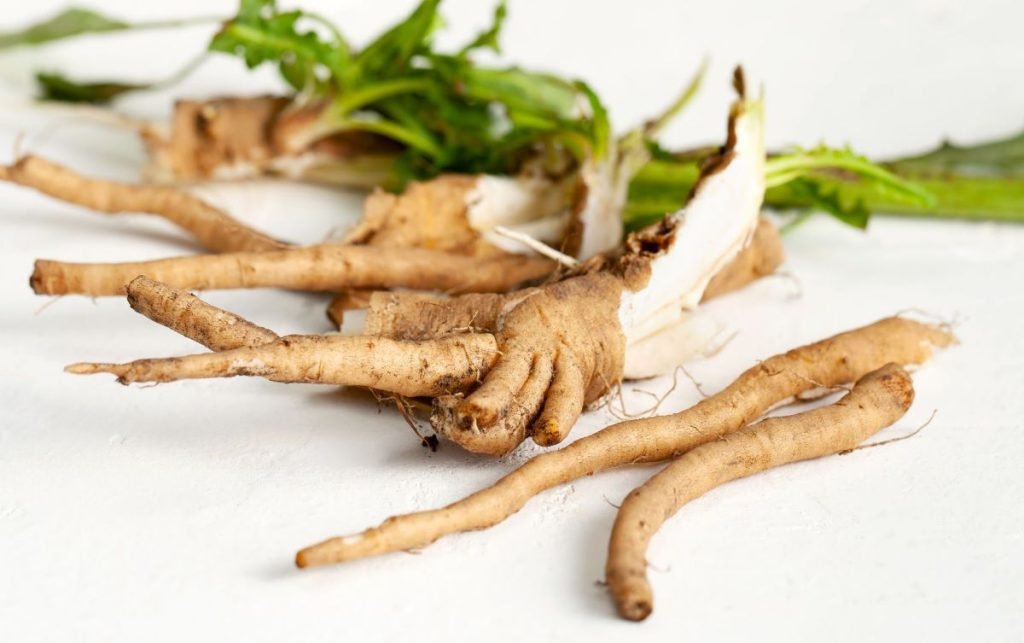
Chicory, a potent source of inulin, is a prebiotic fiber that promotes a healthy gut microbiome and can be incorporated into your diet in various ways. Inulin acts as food for beneficial bacteria in your gut, helping them thrive and support your overall digestive health.
You can add chicory to your diet by using it as a coffee substitute, as it has a similar taste and can provide a caffeine-free alternative. Additionally, chicory leaves can be used in salads or cooked as a vegetable.
It can also be found as a supplement or added to foods like yogurt or smoothies for an extra boost of prebiotic fiber. Including chicory in your diet is a practical way to support a healthy gut and enhance your overall well-being.
19. Artichokes
To incorporate artichokes into your diet, try adding them to salads, roasting them with olive oil and garlic, or using them as a topping for pizza or pasta dishes.
Artichokes aren’t only delicious but also beneficial for your gut health. They’re rich in fiber, which helps support healthy digestion and regular bowel movements.
The fiber in artichokes acts as a prebiotic, providing food for the beneficial bacteria in your gut. This can help promote a healthy gut microbiome and improve overall gut health.
Additionally, artichokes contain antioxidants that have anti-inflammatory properties, which can further support a healthy gut.
20. Leeks
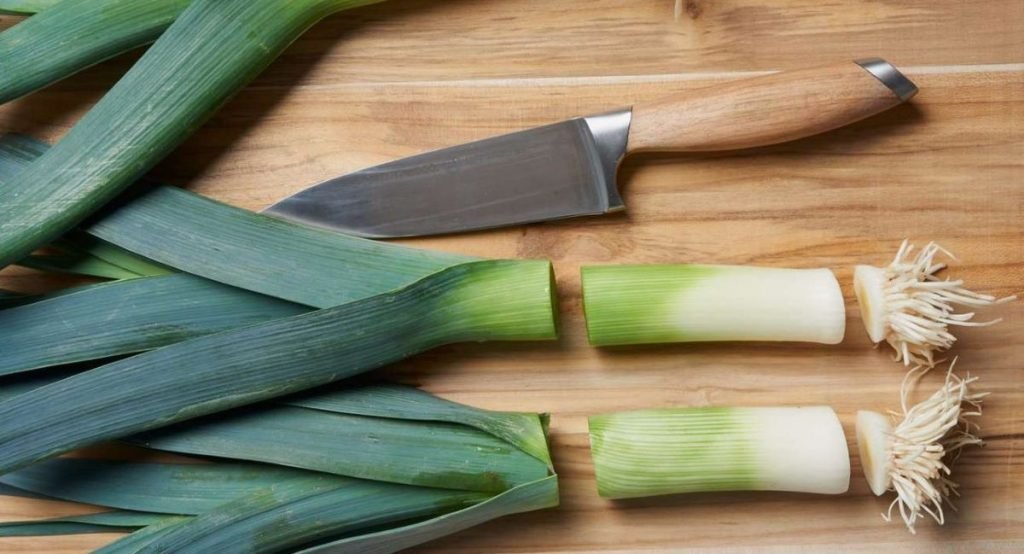
If you’re looking to support your gut health, consider adding leeks to your diet as they’re high in fructans and offer various health benefits.
Leeks are a versatile vegetable that can enhance the flavor of various dishes. They’re low in calories but rich in essential nutrients like vitamins A, C, and K, as well as folate and manganese.
The fructans in leeks act as prebiotics, which feed the beneficial bacteria in your gut and promote a healthy gut microbiome. Additionally, leeks are a good source of fiber, which aids in digestion and supports regular bowel movements.
To incorporate leeks into your diet, you can add them to soups, stews, stir-fries, or simply sauté them as a side dish.
21. Oats
Incorporating oats into your diet can support your gut health by providing a good source of fiber that aids in digestion and promotes regular bowel movements.
Oats are a versatile and nutritious food that can be enjoyed in various ways. They contain a type of fiber called beta-glucan, which has been shown to have prebiotic effects by promoting the growth of beneficial bacteria in the gut. This can help improve the balance of your gut microbiome and support overall gut health.
Additionally, oats are low in calories and packed with nutrients like vitamins, minerals, and antioxidants. They can be enjoyed as oatmeal, added to smoothies, or used in baking recipes.
22. Peas
Peas are a great addition to your diet as they’re high in fiber and provide essential nutrients for a healthy gut. These small green vegetables contain both soluble and insoluble fiber, which are important for maintaining regular bowel movements and supporting the growth of beneficial gut bacteria.
In addition to fiber, peas are also rich in vitamins, minerals, and antioxidants that promote overall gut health. They’re a good source of vitamin C, vitamin K, and manganese, which play a role in immune function, blood clotting, and bone health.
Peas also contain antioxidants like flavonoids and carotenoids, which help reduce inflammation in the gut and protect against chronic diseases.
Including peas in your meals, whether in soups, salads, or stir-fries, is an easy and delicious way to support your gut health.
23. Ginger
Ginger is a powerful spice that can benefit your gut health. It has been used for centuries in traditional medicine for its digestive properties.
Ginger contains compounds called gingerols and shogaols, which have anti-inflammatory and antioxidant effects. These compounds can help reduce inflammation in the gut and promote a healthy balance of gut bacteria.
Ginger also aids in digestion by increasing the production of digestive enzymes and improving the absorption of nutrients. Additionally, ginger has been shown to alleviate symptoms of gastrointestinal disorders like nausea, bloating, and indigestion.
You can incorporate ginger into your diet by adding it to smoothies, stir-fries, teas, or even enjoying it in its raw form. Including ginger in your meals can help support a healthy gut and improve overall digestion.
24. Brussels sprouts
Brussels sprouts are a nutritious vegetable that can support a healthy gut by providing fiber and beneficial nutrients. These small, green cruciferous vegetables are packed with vitamins, minerals, and antioxidants that promote gut health.
Brussels sprouts are an excellent source of fiber, which helps regulate bowel movements and supports the growth of good bacteria in the gut. They also contain glucosinolates, compounds that have been shown to have anti-inflammatory and anticancer properties.
☝️ TIP: To enjoy the benefits of Brussels sprouts, try roasting them with olive oil and a sprinkle of salt and pepper, or add them to stir-fries and salads.
25. Olive oil
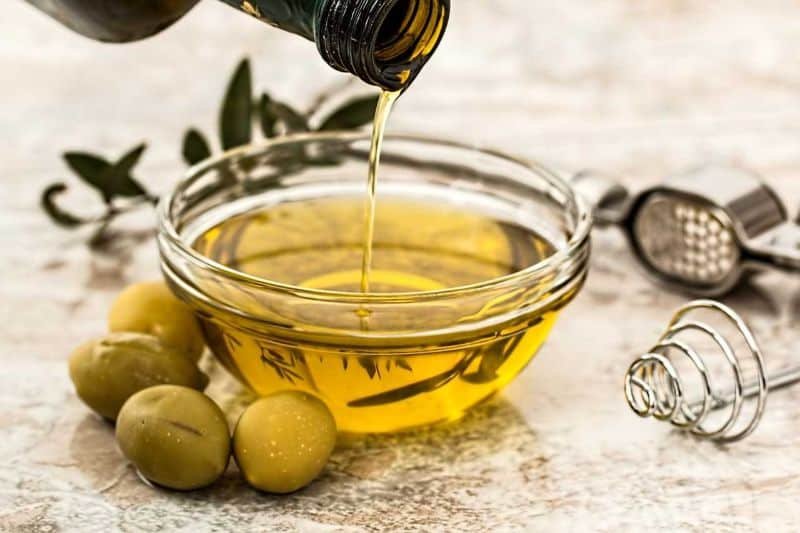
You can enhance the health of your gut by incorporating olive oil into your diet. Olive oil is rich in polyphenols, which have been shown to promote heart health and have positive effects on gut bacteria.
Studies have found that the polyphenols in olive oil can help reduce inflammation in the gut and improve the diversity of gut microbiota. To reap the benefits, choose extra virgin olive oil, as it’s the least processed and retains the highest amount of polyphenols.
Use olive oil as a dressing for salads, a cooking oil in your favorite dishes, or drizzle it over roasted vegetables. Remember, moderation is key, as olive oil is still high in calories.
26. Dark Chocolate
Incorporating dark chocolate into your diet can contribute to a healthy gut due to its high levels of polyphenols, which have antioxidant properties and can positively influence gut bacteria. Polyphenols are plant compounds that gut microbes love and feed on, leading to the production of beneficial substances.
Dark chocolate, with its rich cocoa content, is a great source of these polyphenols. The antioxidants in dark chocolate help reduce inflammation and protect against oxidative stress in the gut.
Additionally, dark chocolate has been shown to increase the growth of beneficial bacteria, such as Bifidobacterium and Lactobacillus, which promote a healthy gut microbiome.
However, it’s important to consume dark chocolate in moderation and choose varieties with high cocoa content and lower added sugars for maximum benefits. Aim for at least 80% cocoa with no added sugars.
27. Apples
Apples, with their high fiber content and polyphenols, can contribute to a healthy gut and are a delicious and convenient snack.
Fiber is essential for a healthy digestive system, as it promotes regular bowel movements and supports the growth of beneficial bacteria in the gut.
The polyphenols found in apples have antioxidant and anti-inflammatory properties, which can help reduce inflammation in the gut and support overall gut health.
Additionally, apples are a great source of vitamins and minerals, such as vitamin C and potassium.
28. Sardines
Now let’s talk about sardines, one of the best food for gut health.
Sardines are small, oily fish that are packed with nutrients. They’re an excellent source of omega-3 fatty acids, which have been shown to reduce inflammation in the gut and support a healthy gut microbiome.
Sardines are also rich in protein, vitamins, and minerals like calcium and vitamin D. These nutrients are important for maintaining a strong immune system and promoting overall gut health.
Incorporating sardines into your diet is easy. You can enjoy them on their own, add them to salads, or use them in various recipes like pasta dishes or sandwiches. Just remember to choose sustainable and responsibly sourced sardines to support the health of our oceans.
☝️ TIP: When choosing sardines, opt for ones that are packed in olive oil or water, rather than those in sauces or added flavors. This will help avoid any unnecessary additives or preservatives that may not be beneficial for your gut.
29. Wild Salmon
If you’re looking to support your gut health, wild salmon is a great option due to its high omega-3 fatty acid content. Omega-3 fatty acids have been shown to reduce inflammation in the gut and support the growth of beneficial bacteria.
Incorporating wild salmon into your diet can help promote a healthy gut microbiome. Wild salmon is also a good source of protein and other essential nutrients like vitamin D and selenium.
☝️ TIP: It’s recommended to include fatty fish like wild salmon in your diet at least twice a week to reap the benefits for your gut health. You can enjoy wild salmon grilled, baked, or even in salads or sushi rolls for a tasty and gut-friendly meal option.
30. Mushrooms
Incorporating mushrooms into your diet can provide a variety of health benefits, including supporting gut health.
Mushrooms are low in calories and packed with important nutrients such as vitamins, minerals, and antioxidants.
They also contain a type of fiber called beta-glucan, which acts as a prebiotic in the gut, feeding the beneficial bacteria and promoting their growth. This can help improve digestion, enhance nutrient absorption, and strengthen the immune system.
Additionally, mushrooms have anti-inflammatory properties and may reduce the risk of chronic diseases like heart disease and cancer. They’re versatile and can be enjoyed in various dishes, such as stir-fries, soups, salads, and even as a meat substitute.
31. Bone Broth
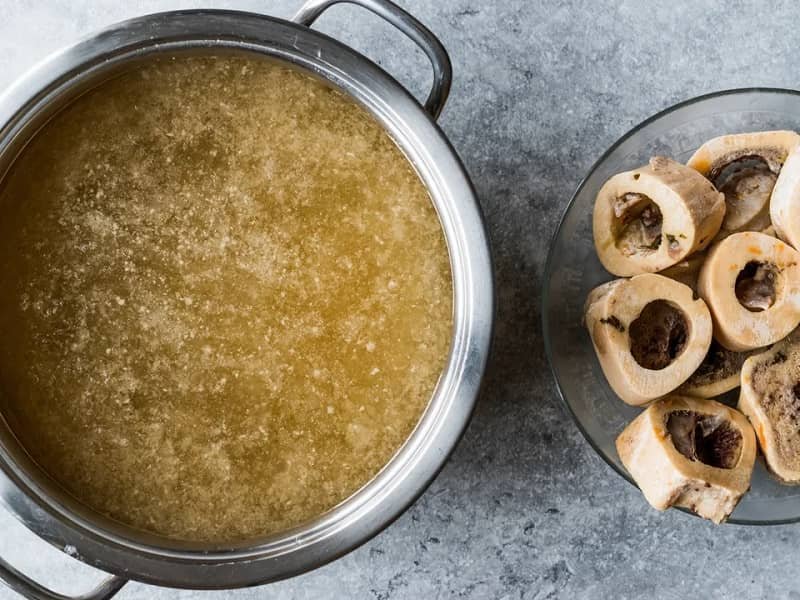
Including bone broth in your diet can provide nourishing benefits for your gut.
Bone broth is made by simmering animal bones and connective tissues, such as chicken or beef, for an extended period.
This slow cooking process extracts essential nutrients like collagen, gelatin, amino acids, and minerals that support gut health.
Collagen and gelatin help to strengthen the lining of the gut, reduce inflammation, and improve digestion. The amino acids in bone broth, such as glutamine and glycine, support the growth of beneficial gut bacteria and aid in the repair of intestinal cells.
Additionally, the minerals found in bone broth, like calcium, magnesium, and phosphorus, contribute to overall gut health.
Including bone broth in your diet can be as simple as sipping a warm cup or incorporating it into soups, stews, or other recipes.
32. Wheat Bran
Wheat bran is a great source of fiber that can support a healthy gut. It’s the outer layer of the wheat kernel and is packed with nutrients. Fiber is essential for maintaining a healthy digestive system and promoting regular bowel movements.
Wheat bran is particularly beneficial because it contains both soluble and insoluble fiber. Soluble fiber absorbs water and forms a gel-like substance in the gut, which helps to soften stools and regulate digestion. Insoluble fiber adds bulk to the stool and promotes regularity.
Including wheat bran in your diet can help prevent constipation, reduce the risk of certain diseases like colon cancer, and support overall gut health. You can easily incorporate wheat bran into your meals by adding it to cereals, smoothies, or baked goods.
33. Avocado

Avocado is a nutrient-rich fruit that can contribute to a healthy gut by providing essential fats and fiber. It’s packed with monounsaturated fats, which are known to promote the growth of good bacteria in the gut.
These fats also help in the absorption of fat-soluble vitamins, such as vitamins A, D, E, and K.
Avocado is also an excellent source of dietary fiber, with about 6-7 grams per half avocado. Fiber is essential for maintaining a healthy gut as it adds bulk to the stool and promotes regular bowel movements.
Additionally, avocado contains various vitamins and minerals, including potassium, magnesium, and vitamin C, which are important for overall gut health.
❌ Worst Foods For Gut Health
When it comes to gut health, there are certain foods that should be avoided. These foods can negatively impact your gut microbiota and contribute to digestive issues.
It’s important to limit your intake of fried foods, alcohol, caffeine, sugary drinks, sugar, white bread, white rice, and white pasta to maintain a healthy gut.
1. Fried Foods
Fried foods, such as french fries and fried chicken, can negatively impact the diversity of your gut microbiota.
When foods are fried, they undergo chemical changes that can be harmful to the bacteria in your gut. These changes can lead to a decrease in the number and variety of beneficial bacteria, which are important for maintaining a healthy gut.
Additionally, fried foods are often high in unhealthy fats, which can contribute to inflammation and digestive issues.
To support a healthy gut, it’s best to limit your consumption of fried foods and opt for healthier cooking methods such as baking, grilling, or steaming.
2. Alcohol
To support a healthy gut, it’s important to moderate your alcohol consumption as well. Excessive intake can harm the gut microbiome and lead to digestive issues.
Alcohol can disrupt the balance of beneficial bacteria in your gut, which can negatively impact digestion and overall gut health. It can also damage the lining of the intestines, making it harder for nutrients to be absorbed properly.
Additionally, alcohol can contribute to inflammation in the gut, leading to discomfort and digestive problems.
To maintain a healthy gut, it’s best to limit your alcohol intake and opt for healthier alternatives like water, herbal tea, or mocktails. Remember, moderation is key when it comes to alcohol and your gut health.
3. Caffeine
If you consume excessive amounts of caffeine, it may have a negative impact on your gut health by disrupting the balance of beneficial bacteria in your digestive system. Caffeine is a stimulant found in coffee, tea, energy drinks, and some medications.
While moderate consumption of caffeine is generally safe, excessive intake can lead to digestive issues such as acid reflux, heartburn, and an upset stomach.
Caffeine can also act as a diuretic, causing increased urination and potentially leading to dehydration, which can further disrupt your gut health.
☝️ TIP: Healthy adults shouldn’t consume more than 400 milligrams (mg) of caffeine per day, which is roughly equivalent to 4 cups of brewed coffee [1]
4. Sugary Drinks, Sugar
When it comes to your gut health, sugary drinks and excessive sugar consumption can have a negative impact on the balance of beneficial bacteria in your digestive system. Consuming too much sugar can lead to an overgrowth of harmful bacteria and yeast, while also reducing the levels of beneficial bacteria.
This imbalance can contribute to digestive issues such as bloating, gas, and even more serious conditions like irritable bowel syndrome (IBS).
It’s important to limit your intake of sugary drinks like soda, fruit (concentrated) juices, and sweetened beverages.
Instead, opt for healthier alternatives like water, herbal tea, or unsweetened drinks. Additionally, try to reduce your overall sugar consumption by choosing whole foods over processed ones and reading food labels to identify hidden sources of sugar.
5. White Bread, White Rice, White Pasta
If you’re looking to improve your gut health, it’s important to consider the types of carbohydrates you consume.
White bread, white rice, and white pasta are all examples of refined grains that can negatively impact your gut microbiota.
These processed foods go through a milling process that removes the outer bran and germ layers, stripping them of their fiber and important nutrients.

When you consume refined grains, they’re quickly broken down into sugar in your body, causing spikes in blood sugar levels. This can lead to inflammation and disrupt the balance of your gut bacteria.
In contrast, whole grains like whole wheat bread, brown rice, and whole wheat pasta contain the entire grain, including the fiber-rich bran and germ. Fiber is essential for a healthy gut as it acts as fuel for beneficial bacteria in your intestines.
6. Artificial Sweeteners
Artificial sweeteners can negatively impact your gut microbiota, so it’s best to consume them in moderation. While artificial sweeteners may seem like a healthier alternative to sugar, research suggests that they can disrupt the balance of beneficial bacteria in your gut.
Studies have shown that artificial sweeteners, such as saccharin, sucralose, and aspartame, can alter the composition and function of the gut microbiome, leading to potential negative effects on digestive health. [2]
To maintain a healthy gut, it’s important to limit your intake of artificial sweeteners. Instead, opt for natural sweeteners like honey or maple syrup.
7. Saturated Fats
Including excessive amounts of saturated fats in your diet can have a negative impact on your gut health. Saturated fats are found in foods like fatty meats, full-fat dairy products, butter, and coconut oil.
These fats can increase inflammation in the body and disrupt the balance of bacteria in your gut.
Studies have shown that a diet high in saturated fats can lead to an imbalance in gut bacteria, which can contribute to digestive issues, inflammation, and even chronic diseases.
To promote a healthy gut, it’s important to limit your intake of saturated fats and focus on consuming healthier fats like those found in avocados, nuts, and olive oil.
8. Processed Meats
Limit your consumption of processed meats as they can negatively impact your gut health. Processed meats, such as hot dogs, sausages, and deli meats, undergo various chemical processes and additives that can harm the balance of bacteria in your gut.
These meats are often high in sodium, unhealthy fats, and preservatives, which can disrupt the natural flora in your gut and contribute to inflammation and digestive issues.
Instead, opt for lean, unprocessed meats like chicken, turkey, and fish, which provide essential nutrients without the negative effects on your gut health. Additionally, incorporating more plant-based proteins such as beans, lentils, and tofu can be beneficial for your gut microbiome.
9. Highly Spicy Foods
When consuming highly spicy foods, be mindful of their potential effects on your gut health. Spicy foods can cause discomfort such as heartburn, indigestion, and irritation of the gastrointestinal tract.
Capsaicin, the compound responsible for the heat in spicy foods, can disrupt the balance of bacteria in your gut. This can lead to digestive issues and an imbalance in the gut microbiome.
To support your gut health while enjoying spicy foods, you can incorporate other gut-friendly foods into your diet. Probiotic-rich foods like yogurt and fermented vegetables can help maintain a healthy gut microbiota. Prebiotic foods like garlic and onions provide nourishment for beneficial gut bacteria.
Additionally, consuming fiber-rich foods like whole grains and fruits and vegetables can promote regular bowel movements and support gut health.
Synbiotic Foods – Combining Probiotic foods with Prebiotics
To maximize the health benefits for your gut, consider incorporating synbiotic foods into your diet. These foods combine probiotics and prebiotics to support the growth of beneficial bacteria.
Synbiotic foods can help improve digestion, enhance nutrient absorption, and boost overall gut health. Examples of synbiotic foods include yogurt, sauerkraut, kefir, and kimchi.
These foods provide a double punch of probiotics and prebiotics, helping to increase the population of good bacteria in your gut. Probiotics introduce live bacteria into your system, while prebiotics serve as food for these bacteria.
Here’s a table with 10 synbiotic food combinations:
| Synbiotic Food Combinations | Probiotic | Prebiotic |
|---|---|---|
| Yogurt with Berries | Lactobacillus acidophilus, Bifidobacterium lactis | Inulin from berries |
| Kefir with Oats | Lactobacillus kefiranofaciens, Lactobacillus kefir, Bifidobacterium bifidum | Beta-glucan from oats |
| Kimchi with Whole Grains | Lactobacillus plantarum, Lactobacillus brevis | Dietary fiber from whole grains |
| Pickles with Garlic | Lactobacillus plantarum, Lactobacillus brevis | Fructooligosaccharides from garlic |
| Miso Soup with Seaweed | Lactobacillus plantarum, Lactobacillus brevis | Alginate from seaweed |
| Tempeh with Brown Rice | Rhizopus oligosporus, Rhizopus oryzae | Resistant starch from brown rice |
| Sourdough Bread with Avocado | Lactobacillus sanfranciscensis, Lactobacillus brevis | Inulin from avocado |
| Dark Chocolate with Bananas | Lactobacillus acidophilus, Bifidobacterium lactis | Resistant starch from bananas |
| Sauerkraut with Sweet Potatoes | Lactobacillus plantarum, Lactobacillus brevis | Dietary fiber from sweet potatoes |
| Apple Cider Vinegar with Honey | Acetobacter aceti, Acetobacter pasteurianus | Fructooligosaccharides from honey |
Frequently Asked Questions
Final Take
Incorporating gut-healthy foods into your diet is essential for improving your gut health and overall well-being.
By including probiotics like sauerkraut and kefir, prebiotics found in garlic and bananas, and fiber-rich foods like whole grains and legumes, you can support a thriving gut microbiome and promote digestion.
Additionally, avoiding artificial sweeteners, excessive red meat consumption, processed foods, alcohol, and added sugars can help maintain a healthy gut.
By making informed choices and incorporating these recommendations, you can take steps towards a healthier gut and a happier you.
Ginkgo Biloba Extract Tablets | 120mg | Minimum 10% Kaempferol Glycoside + 2% Bilobalide
High quality Gingkgo Biloba supplement with 90 servings per bottle (one month supply). As a dietary supplement, take 1 Gingko Biloba tablet daily.
This supplement will help you promote cognitive function and cellular function, support cardiovascular function, balanced inflammation and oxidation levels.
⭐⭐⭐⭐⭐ | 4.7 (16 reviews)
Related Posts

